This is an old revision of this page, as edited by Neutrality (talk | contribs) at 07:13, 16 August 2015 (bracket fixes). The present address (URL) is a permanent link to this revision, which may differ significantly from the current revision.
Revision as of 07:13, 16 August 2015 by Neutrality (talk | contribs) (bracket fixes)(diff) ← Previous revision | Latest revision (diff) | Newer revision → (diff)
 The Cogan House Covered Bridge, U.S.A. The Cogan House Covered Bridge, U.S.A. | |
| Ancestor | Truss bridge, others |
|---|---|
| Related | Tubular bridge, Skyway, Jetway |
| Descendant | None |
| Carries | Pedestrians, livestock, vehicles |
| Span range | Short |
| Material | Typically wood beams with iron fittings and iron rods in tension |
| Movable | No |
| Design effort | Low |
| Falsework required | Determined by enclosed bridge structure, site conditions, and degree of prefabrication |
A covered bridge is a timber-truss bridge with a roof and siding which, in most covered bridges, create an almost complete enclosure. The purpose of the covering is to protect the wooden structural members from the weather. Uncovered wooden bridges have a life span of only 10 to 15 years because of the effects of rain and sun.
Bridges having covers for reasons other than protecting wood trusses, such as for protecting pedestrians and keeping horses from shying away from water, are also sometimes called covered bridges.
History and development

Early timber covered bridges consisted of horizontal beams laid on top of piles driven into the riverbed. The problem is that the length between spans is limited by the maximum length of each beam. The development of the timber truss allowed bridges to span greater distances than those with beam-only structures or arch structures, whether of stone, masonry, or timber.
Early European truss bridges used king post and queen post configurations. Some early German bridges included diagonal panel bracing in trusses with parallel top and bottom chords. To solve the problem of deterioration of the wood upon exposure to weather, various forms of covering came to be employed.
At least two covered bridges make the claim of being the first built in the United States. Town records for Swanzey, New Hampshire, indicate their Carleton Bridge was built in 1789, but this remains unverified. Philadelphia, however, claims a bridge built in the early 1800s on 30th Street and over the Schuylkill River was the first, noting that investors wanted it covered to extend its life. Beginning around 1820, new designs were developed, such as the Burr, Lattice, and Brown trusses.
In the mid-1800s, the development of cheaper wrought iron and cast iron led to metal rather than timber trusses, except in those areas of plentiful large timber.
Examples of covered bridges

There are about 1600 covered bridges in the world.
Europe
- Germany: Holzbrücke Bad Säckingen, over the river Rhine from Bad Säckingen, Germany, to Stein, Switzerland (picture), first built before 1272, destroyed and re-built many times.
- Switzerland has many timber covered bridges: Bridge over the river Muota, Brunnen, near Lake Lucerne (picture), Berner Brücke/Pont de Berne over the Saane/Sarine, near Fribourg, (picture), Kapellbrücke.
Asia
- China: covered bridges are called lángqiáo (廊桥), or "wind and rain bridges" in Guizhou, traditionally built by the Dong. There are also covered bridges in Fujian. Taishun County, in southern Zhejiang province near the border of Fujian, has more than 900 covered bridges, many of them hundreds of years old, as well as a covered bridge museum. There are also a number in nearby Qingyuan County, as well as in Shouning County, in northern Fujian province. The Xijin Bridge in Zhejiang is one of the largest.
Canada
The Hartland Bridge is the longest covered bridge in the world. In 1900, Quebec, New Brunswick, and Ontario had an estimated 1000, 400, and five covered bridges respectively. By the 1990s there were 98 in Quebec, 62 in New Brunswick, and one in Ontario, the West Montrose Covered Bridge.
United States
According to Covered Bridges Today by Brenda Krekler, as many as 12,000 covered bridges once existed in the United States; that number dropped by under 1,500 by the 1950s. The National Society for the Preservation of Covered Bridges was formed in 1950.
The Federal Highway Administration (FHWA) encourages the preservation of covered bridges with its Covered Bridge Manual.
Today, covered bridges exist in several states:
- Alabama (list of Alabama covered bridges)
- California: eleven were reported in 2002, including one at Knight's Ferry
- Connecticut - several wooden covered bridges exist over the Housatonic River
- Georgia (list of covered bridges in Georgia (U.S. state))
- Illinois - five covered bridges remain in the state, most notably the Red Covered Bridge north of Princeton
- Indiana (list of Indiana covered bridges) - In 1980, Indiana was reported as having 130 extant covered bridges, with the highest number (36) in Parke County.
- Iowa - Nineteen covered bridges were built in Iowa between 1855 and 1885; nine remain, five of which are in Madison County around Winterset (see List of covered bridges in Madison County, Iowa).
- Maine (list of Maine covered bridges)
- Maryland
- Michigan (list of Michigan covered bridges)
- Missouri (list of Missouri covered bridges)
- Minnesota (list of Minnesota covered bridges)
- Massachusetts - see list of bridges on the National Register of Historic Places in Massachusetts
- New Hampshire (list of New Hampshire covered bridges)
- New York (list of New York covered bridges)
- North Carolina: two remain, the Pisgah and Bunker Hill
- Ohio (List of Ohio covered bridges): 142 remain, the second-highest of any state; down from over 4,000 at peak.
- Oregon (list of Oregon covered bridges)
- Pennsylvania: has some 219 remaining, the most of any state.
- Rhode Island
- Tennessee
- Vermont (list of covered bridges in Vermont) - "Vermont is justly famous for her covered bridges. No other state has built and still possesses so many of the old timbered crossings in so small an area." In 1996, 106 covered bridges were reported in Vermont.
- Virginia (list of Virginia covered bridges)
- Wisconsin - The only remaining historic covered bridge in Wisconsin is the covered bridge in Cedarburg. (There is also the Smith Rapids Covered Bridge in Park Falls, but it was built in 1991).
- West Virginia - list of West Virginia covered bridges
Other covered bridges

The term covered bridge is also use to describe any bridge-like structure that is covered. For example:
- The Lovech Covered Bridge in Bulgaria is covered not for structural reasons, but to accommodate shops.
- The Pont de Rohan in Landerneau, France is one of 45 inhabited bridges in Europe.
- A tubular bridge is a bridge built as a rigid box girder section within which the traffic is carried. Examples include the Britannia Bridge and the Conwy Railway Bridge in the United Kingdom.
- A skyway is a type of urban pedway consisting of an enclosed or covered footbridge between two buildings, designed to protect pedestrians from the weather. For example, the Bridge of Sighs in Cambridge, and Oxford's Bridge of Sighs and Logic Lane covered bridge.
- A jet bridge is an enclosed, movable connector which extends from an airport terminal gate to an airplane, allowing passengers to board and disembark without having to go outside.
- Some stone arch bridges are covered to protect pedestrians or as a decoration as with the Italian Ponte Coperto and Rialto Bridge, and the Chùa Cầu (the Japanese Bridge; picture) in Vietnam.
Covered bridges in fiction
Covered bridges are popular in folklore and fiction.
North American covered bridges received much recognition as a result of the success of the novel, The Bridges of Madison County written by Robert James Waller and made into a Hollywood motion picture starring Meryl Streep and Clint Eastwood. The Roseman Covered Bridge from 1883 in Iowa became famous when it was featured in both the novel and the film. A covered bridge is also prominently featured in the story "Never Bet the Devil Your Head" by Edgar Allan Poe, and covered bridges serve as plot points in the 1988 comedy films Beetlejuice and Funny Farm.
Gallery
-
 Covered Bridge at Bowie Race Track
Covered Bridge at Bowie Race Track
-
West Dummerston Covered Bridge
-
 Irgandı Bridge, Bursa, Turkey
Irgandı Bridge, Bursa, Turkey
-
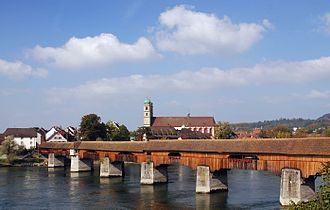 Holzbrücke, Bad Säckingen
Holzbrücke, Bad Säckingen
-
 Kapellbrücke, Luzern
Kapellbrücke, Luzern
-
Oldest covered railroad bridge in the United States is located at Hopkinton, New Hampshire.
-
Covered bridge at the Cole Land Transportation Museum in Bangor, Maine
-
Hartland Bridge
-
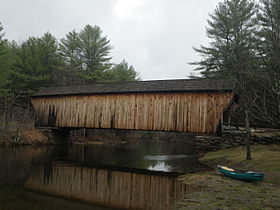 Corbin covered bridge over North Branch where it enters the Sugar River in Newport, NH
Corbin covered bridge over North Branch where it enters the Sugar River in Newport, NH
-
 Dong Minority Bridge
Dong Minority Bridge
-
 Xijin Bridge in Zhejiang, China
Xijin Bridge in Zhejiang, China
-
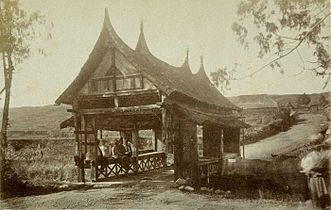 A covered bridge in West Sumatra, Indonesia (1877-1879)
A covered bridge in West Sumatra, Indonesia (1877-1879)
-
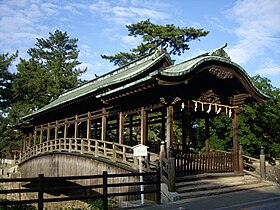 "鞘橋" (Saya Bridge) in Kotohira, Japan
"鞘橋" (Saya Bridge) in Kotohira, Japan
-
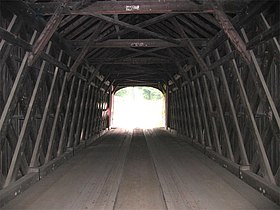 Plank-lattice truss interior structure of Green River Bridge in Guilford, Vermont
Plank-lattice truss interior structure of Green River Bridge in Guilford, Vermont
-
 Covered bridge entrance, Frankenmuth, Michigan
Covered bridge entrance, Frankenmuth, Michigan
-
 The Russein Bridge (Russeinerbrücke) in Switzerland under construction in 1857. The falsework under the bridge was removed after the bridge was finished.
The Russein Bridge (Russeinerbrücke) in Switzerland under construction in 1857. The falsework under the bridge was removed after the bridge was finished.
-
 Rosenman Covered Bridge which is located in Madison County Iowa
Rosenman Covered Bridge which is located in Madison County Iowa
References
- "Covered bridge". Encyclopedia Britannica. Retrieved 8 October 2012.
- "Bridges of Woolwich Township". Woolwich.ca. Township of Woolwich. Retrieved 25 February 2014.
{{cite web}}:|section=ignored (help) - ^ "Covered Bridge Manual". U.S. Department of Transportation. Retrieved 9 October 2012.
- History/Design Pennsylvania Covered Bridges; accessed 2015.02.26.
- Marshall, Richard G. (1994). "Carleton Bridge". New Hampshire Covered Bridges: A Link With Our Past. Concord: New Hampshire Department of Transportation. OCLC 31182444.
{{cite book}}: External link in|chapterurl=|chapterurl=ignored (|chapter-url=suggested) (help) - Kopas, Virginia (30 March 2012). "Pennsylvania is among the tops in the number of covered bridges". Pittsburgh Post-Gazette. Archived from the original on 9 October 2012. Retrieved 9 October 2012.
{{cite news}}: Unknown parameter|deadurl=ignored (|url-status=suggested) (help) - "World Guide to Covered Bridges". WoodCenter.org. Iowa State University Institute for Transportation. Retrieved 9 October 2012.
- "Swiss Timber Bridges".
- "Fujian Bridges!". Amoymagic.mts.cn. 17 January 2004. Retrieved 4 January 2012.
- "Museum of Ancient Bridges, Taishun County". China.org.cn. 27 June 2002. Retrieved 4 January 2012.
- "Langqiao.net" (in Chinese).
- "Ponts couverts". Transports Quebec. Retrieved 26 September 2012.
- "New Brunswick Covered Bridges". Retrieved 8 October 2012.
- "West Montrose Covered Bridge". Region of Waterloo. Archived from the original on 19 January 2011. Retrieved 31 October 2009.
- ^ Benjamin D. Evans & June R. Evans, New England's Covered Bridges: A Complete Guide (University Press of New England: 2004), p. 10.
- "Covered Bridge Manual". U.S. Department of Transportation. Retrieved 28 November 2012.
- Mildred Brooke Hoover et al., Historic Spots in California, Stanford University Press: 5th ed. 2002, p. 107.
- "Knights Ferry SHP: California's Longest Covered Bridge". Retrieved 28 November 2012.
- Lyndee Henderson, Off the Beaten Path Illinois: A Guide to Unique Places (10th ed: Morris, 2010), p. 110.
- John M. Vlach, "Joseph J. Daniels and Joseph A. Britton: Parke County's Covered Bridge Builders" in Indiana Folklore: A Reader (ed. Linda Dégh: Indiana University Press, 1980), p. 22.
- Eric Dregni, Midwest Marvels: Roadside Attractions Across Iowa, Minnesota, the Dakota, and Wisconsin (University of Minnesota Press, 2006), p. 84.
- "Maryland's Six Existing Covered Bridges". Maryland Covered Bridges. Retrieved 1 July 2014.
- "Covered Bridge". Zumbrota Covered Bridge. Retrieved 16 July 2014.
- John Hairr, North Carolina Rivers: Facts, Legends, and Lore (The History Press: 2007), p. 119-20.
- ^ Elma Lee Moore, Ohio's Covered Bridges (Arcadia Publishing: 2010), p. 7.
- "Swamp Meadow Covered Bridge". VisitRhodeIsland.com. Retrieved 11 July 2013.
- "Covered Bridges in Tennessee". Tennessee Department of Transportation. Retrieved 28 November 2012.
- Richard Sanders Allen, Covered Bridges of the Northeast (Stephen Greene Press, 1983), p. 50.
- Ed Barna, Covered Bridges of Vermont (Countryman Press, 1996).
- Brian J. McKee, Historic American Covered Bridges (ASCE Press: 1997), p. 143.
- Ryan Gierach, Cedarburg: A History Set in Stone (Acadia Publishing, 2003), p. 145.
- Smith Rapids Covered Bridge, TravelWisconsin.com.
- Chrimes, Mike (1991). Civil Engineering, 1839-1889. London: Alan Sutton. p. 47. ISBN 1-84015-008-4.
- Gesell, Laurence E (1992). The Administration of Public Airports. Chandler, AZ: Coast Aire. pp. 114–115. ISBN 0-9606874-7-5.
- Dégh, Linda, ed. (1980). Indiana Folklore: A Reader. Bloomington: Indiana University. p. 42. ISBN 0253202396.
{{cite book}}: Unknown parameter|editorlink=ignored (|editor-link=suggested) (help)
External links
- Covered Bridge Security Manual United States Forest Service
- Use of Laser Scanning Technology to Obtain As-Built Records of Historic Covered Bridges United States Forest Service
- "Covered Spans of Yesteryear", documenting the current and former covered bridges of the United States and Canada
- National Society for the Preservation of Covered Bridges
- Covered Bridge Map, an interactive map showing locations of covered bridges in the United States and Canada
- Template:Fr icon "Les ponts couverts au Québec, héritage précieux", an article on covered bridges in Quebec